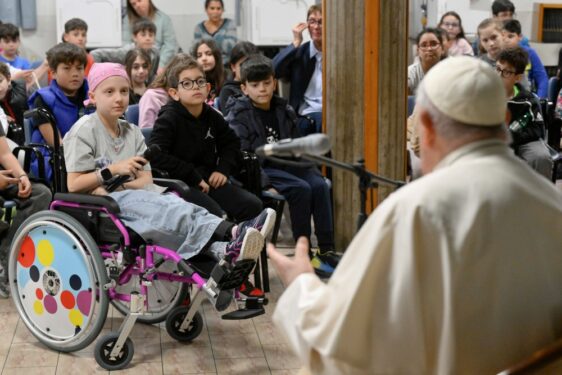
By Justin McLellan
VATICAN CITY — Today’s “throwaway culture,” driven by “profit, efficiency and success,” marginalizes people with disabilities and threatens their God-given dignity, Pope Francis said.
Using “utilitarian and functional criteria” to decide the value of a human life can lead to “serious violations of the rights of the weakest people” and create “great injustice and inequality,” he told members of the Pontifical Academy of Social Sciences April 11.
The academy, formed by scholars from around the globe, held a three-day plenary session on “Disability and the Human Condition” at the Vatican.
Meeting with them on the last day of their conference, Pope Francis highlighted a “less visible and very insidious” aspect of today’s culture that erodes the value of disabled persons in the eyes of society: “the tendency that leads one to consider their own existence a burden to his- or herself and to his or her loved ones.”
“The spread of this mentality transforms the throwaway culture into a culture of death,” he said.
The pope condemned the idea that certain lives are “not needed,” such as the unborn who are aborted or the elderly who pursue assisted suicide.
To combat a “throwaway culture,” Pope Francis proposed promoting a “culture of inclusion” which removes the barriers that impede all people from accessing basic rights and freedoms.
While he said such active efforts are predominantly seen in economically developed countries, the pope encouraged the international community to support the efforts of poorer nations to further include disabled persons in all fields of society, including education, culture, work and sport.
Yet Pope Francis also noted that true inclusion occurs “when people with disabilities are not passive recipients but participate in social life as protagonists of change.”
The pope underscored the injustice of people and their families being pushed to the margins of society due to disability, particular in poor countries, but he noted how even in wealthier contexts a person’s disability “is considered a ‘personal tragedy'” and not taken into consideration by the whole of society.
Jesus did not ignore or turn away people with disabilities, he said, rather he went out to meet them and “changed the meaning of their experience.”
“Indeed, for him, every human condition, even those marked by great limitations, is an invitation to weave a singular relationship with God who makes people flourish once again,” the pope said.
